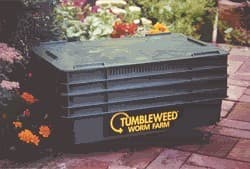Vermicomposting or Worm Composting

About Vermicomposting
We encourage all gardeners to also become worm farmers. Gardeners just love worms. That’s because we know worms are like a 24-hour factory, constantly churning out product. That product is rich worm compost or vermicompost. The raw material is vegetable waste, including kitchen scraps. And it means worms play an important role in the “Going Green” effort. They help reduce yard and kitchen waste that would otherwise go to the local landfill. Vermicomposting, therefore, is the process of maintaining a worm farm to make worm compost to feed all of your hungry garden plants.
Worm Trivia: Scoleciphobia is the fear of worms
Did you know? Some insecticides are harmful to worms. Among them is Sevin, a popular garden insecticide.
Unraveling the Confusing Vermicomposting Terms
Common terms used in worm composting and vermicomposting are often confusing. That’s simply because many terms are synonymous. Let’s take the confusion out of these terms:
Worm Composting = Vermicomposting: This is the process of using worms to convert vegetable matter into a rich manure.
Worm Farm: This is the location, or container where your worms live and perform the process of vermicomposting. Whether you know it or not, a compost pile in your garden is a natural worm farm.
Worm Castings = Worm Compost = Vermicompost: That’s right, these three terms describe the very same thing. Worm castings is the excrement of worms. It is one of the richest of all manures.
We will use the terms interchangeably, to help you get used to them.
How to Grow a Worm Farm
Worm farms can be created from just about any container. Plastic containers are perhaps the most durable. Metal containers, or boxes, can get too hot if left in a sunny location. Wooden boxes can rot quickly. And you can put just about any garden vegetable matter into a worm farm.
You can feed just about any vegetable kitchen scrap to your worms. This includes coffee grinds and the coffee filter, tea bags, and eggshells. It is suggested that you rinse the eggshells first.
Do not put meats or dairy products into your farm.
Provide your worm farm with a regular supply of “food”, and they will happily work for you. It’s as easy as that.
Worms are accustomed to the dark, damp, and cool environment under your soil. Keep your farm out of the heat, and out of direct sunlight. Place your worm composter in a shaded area of your yard. Your worm farm should not be allowed to get hot.
Also, check the moisture content of the material inside your worm farm. It should be moist. Allow for drainage at the bottom.
Did you Know? Worms consume about 50 % of their weight in food each day.
The Best Worms for Vermicomposting
Use any and all varieties of worms for your worm farm. (there are many varieties) Some are more efficient than others.
Red wigglers are the best for farms. Like other varieties, they are very efficient. Red wigglers tolerate crowding in a farm. And, importantly, they do not burrow, like many other varieties of worms. Rather, they eat their way up through a pile of compost, leaving compost behind as they move upwards. This makes harvesting the vermicomposting an easier task.
Did you Know? Worms are on the diet of skunks, raccoons, and a few other wild animals.
Related Articles
People who like this article will also like:
Composting – a whole lot more about this topic.
Please support our site. Shop for:
- rmmatthews100@hotmail.com
- 585-721-6528
- Rochester, NY
©1999-2024 GardenersNet.Com, All Rights Reserved

